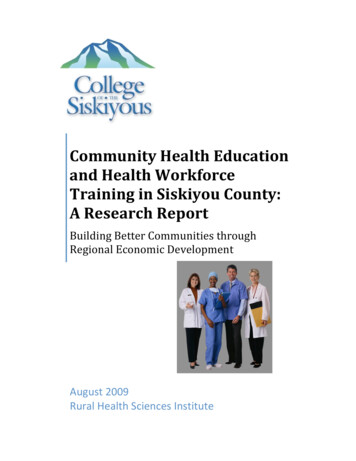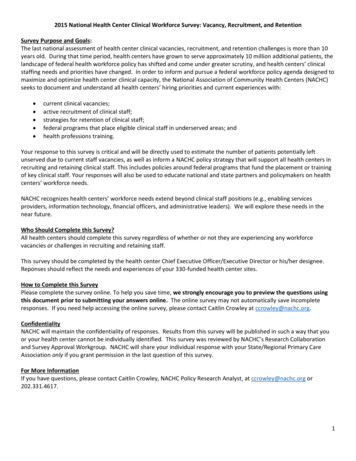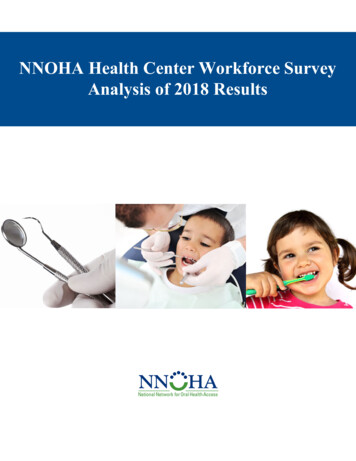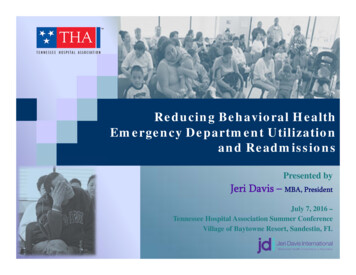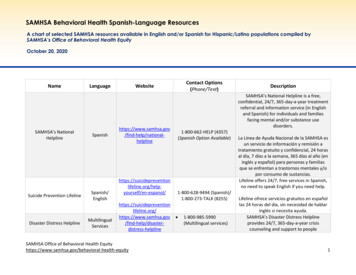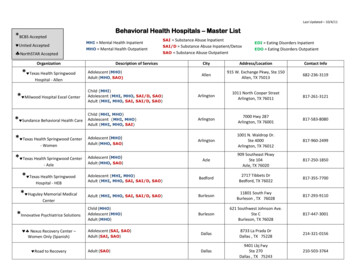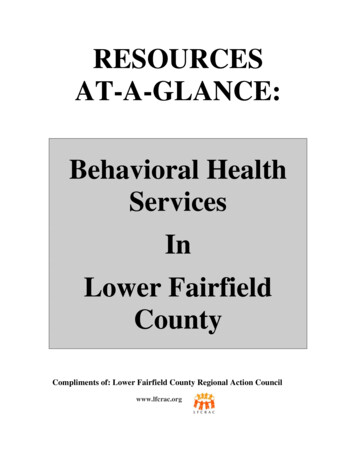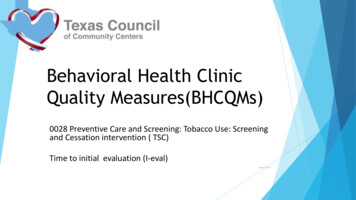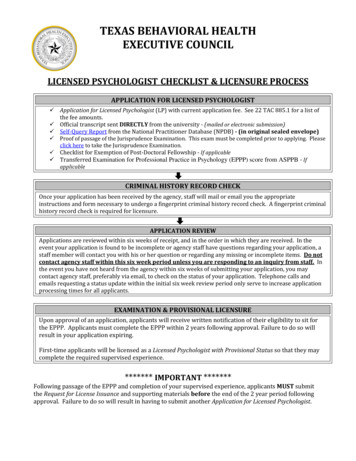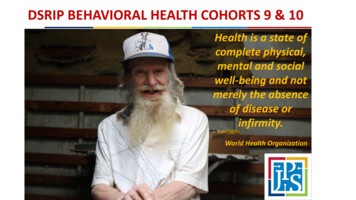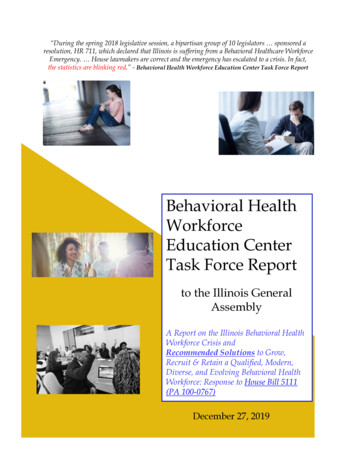
Transcription
“During the spring 2018 legislative session, a bipartisan group of 10 legislators sponsored aresolution, HR 711, which declared that Illinois is suffering from a Behavioral Healthcare WorkforceEmergency. House lawmakers are correct and the emergency has escalated to a crisis. In fact,the statistics are blinking red.” - Behavioral Health Workforce Education Center Task Force ReportBehavioral HealthWorkforceEducation CenterTask Force Reportto the Illinois GeneralAssemblyA Report on the Illinois Behavioral HealthWorkforce Crisis andRecommended Solutions to Grow,Recruit & Retain a Qualified, Modern,Diverse, and Evolving Behavioral HealthWorkforce: Response to House Bill 5111(PA 100-0767)December 27, 2019
Task Force MembersChairman: Marvin Lindsey, MSW, CADCChief Executive OfficerCommunity Behavioral Healthcare Association of IllinoisSukhveer Bains, MDAssistant Professor of Clinical EmergencyMedicine and Internal MedicineUniversity of Illinois at Chicago Hospital &Health Sciences System (UI Health)Sonya Leathers, PhDProfessorUniversity of Illinois at Chicago, Jane AddamsCollege of Social WorkCourtney Boddie, PhDDirector of Counseling ServicesSouthern Illinois University at EdwardsvilleJanet Liechty, PhD, MSW, LCSWAssociate ProfessorUniversity of Illinois at Urbana-Champaign,School of Social WorkStephen Brown, MSW, LCSWDirector of Preventive Emergency MedicineUniversity of Illinois at Chicago Hospital &Health Sciences System (UI Health)Ann McCaughan, PhDAssociate Professor & Department ChairDepartment of Human Development CounselingUniversity of Illinois at SpringfieldBlanca Campos, MPAVice President of Public Policy and GovernmentAffairsCommunity Behavioral Health Association ofIllinoisRobin Mermelstein, PhD,Distinguished Professor of PsychologyUniversity of Illinois at ChicagoDirectorInstitute for Health Research and Policy,University of Illinois at ChicagoHolly Cormier, PhDDirector of the Clinical CenterSouthern Illinois University at CarbondaleColleen Cicchetti, PhDExecutive DirectorCenter for Childhood Resilience,Pritzker Department of Psychiatry andBehavioral Health, Ann & Robert H. LurieChildren’s Hospital of ChicagoAssociate ProfessorNorthwestern University Feinberg School ofMedicineDiana Knaebe, MSWDirectorIllinois Department of Human Services, Divisionof Mental HealthJaimee Ray, BSSenior Associate DirectorIllinois Board of Higher EducationTerry Vanden Hoek, MD, FACEPProfessor and HeadDepartment of Emergency MedicineUniversity of Illinois at Chicago College ofMedicineKari Wolf, MDAssociate Professor and Chair,Department of PsychiatrySouthern Illinois University School of Medicine
Stakeholder ContributorsSherie ArriazolaAssociate Vice President ofBehavioral Health ServicesSafer FoundationRegina CriderDirectorYouth & Family Peer SupportAllianceLia DanielsManager of Health Policyand FinanceIllinois Health and HospitalAssociationErin E. Emery-Tiburcio,Ph.D., ABPPAssociate ProfessorRush University Departmentof Behavioral SciencesGeriatric and RehabilitationPsychologyMelissa Fischer, PhDVice President of Curriculum,Research, and AccountabilityGolden AppleStephanie Frank, LCSWDeputy Director of Planning,Performance Assessment andFederal ProjectsDHS/SUPR – Division ofSubstance Use Preventionand RecoveryNeha GillExecutive DirectorApna Ghar, Inc.Angie HamptonChief Executive OfficerEgyptian Health DepartmentJessica HayesExecutive DirectorIllinois Certification BoardSara HoweChief Executive OfficerIllinois Association forBehavioral HealthJim KaitschukExecutive DirectorIllinois Sheriffs’ AssociationHoward Liu, M.D., M.B.A.Chair and Associate ProfessorUniversity of NebraskaMedical Center, College ofMedicine, Department ofPsychiatryFormer Co-Director,Behavioral Health EducationCenter of Nebraska (BHECN)Brent Khan, Ed.D.Co-DirectorBehavioral Health EducationCenter of Nebraska (BHECN)Martin MacDowell, DrPH,MBA, MS and ACHE FacultyAssociateResearch Professor andAssociate DirectorRural Health ProfessionsProgram, University of Illinoisat Rockford – Colleges ofMedicine and PharmacyHeather O'DonnellSenior VP, Public Policy andAdvocacyThresholdsSusan M. Scherer, M.D.Pediatric and GeneralPsychiatryMeryl SosaExecutive DirectorIllinois Psychiatric SocietySeth Seabury, PhDDirectorUSC Keck-Schaeffer Initiativefor Population Health PolicyLinda Xóchitl TortoleroPresident and CEOMujeres Latinas en AcciónAmanda M. Walsh, JD, LLM,MSWDirectorIllinois Children’s MentalHealth Partnership
Report AuthorSharon Post, BAPaterson Healthcare Writing & Research LLCReport UnderwriterOPTUM Health
Table of ContentsExecutive Summary1Introduction6Behavioral Health Workforce DataIllinois State DataNational DataNext Steps for Behavioral Health Workforce Data CollectionBehavioral Health Workforce Shortages—Evidence and Paths ForwardUnmet Need for Behavioral Health ServicesBehavioral Health Workforce SupplyLessons from Behavioral Health EmployersReplicable Models to Address Behavioral Health Workforce ShortagesSupport for Use of Evidence-Based PracticesIllinois Strengths and Assets for Evidence-based PracticesModel Program for Training in Evidence-based Practices: The North CarolinaChild Treatment ProgramTraining the Future Behavioral Health Workforce in Evidence-based PracticesNext Steps and Recommendations for a Workforce ix A1: Task Force Enabling LegislationAppendix A2: HB 5111 as Introduced, with Concepts for Study by the Task ForceAppendix B: Table of HB 5111 Concepts and Findings of the Task ForceAppendix C: Select Licensure Data from the Illinois Department of Financial andProfessional RegulationAppendix D: Map of Certification-holders by RegionAppendix E: Stakeholder FeedbackAppendix F1: Behavioral Health Education Center of Nebraska BudgetAppendix F2: Comparison Population and Workforce Needs of Nebraska and Illinois535559626571727879
EXECUTIVE SUMMARYWe have had no applicants for clinical positions who have possessed a master's degree orlicense since 2018. In 2019 we have only been able to hire individuals with bachelor’s degreesand no experience or minimal experience to fill clinical positions. Georgianne Broughton,Executive Director, Community Resource CenterSince the budget impasse we have seen turnover numbers or vacancies that we are unable to fillat records rates. Some behavioral healthcare positions have a 60% turnover and some positionshave been vacant for over 1 year. Sherrie L. Crabb, MS, QMH, Chief Executive Officer, FamilyCounseling Center, IncWe currently have over 50 full and part-time clinical positions open with very few applicantscausing waitlists in many of our programs. Joan Hartman, Vice President of Strategy &Innovation, Chestnut Health SystemsWithout workforce development initiatives, access to treatment will remain elusive for millionsbecause there are simply not enough workers. Heather O’Donnell, Vice President of PublicPolicy and Advocacy, ThresholdsThe quotes listed above are from community behavioral health providers and stakeholdersacross the state of Illinois. Behavioral health workforce shortages, which have been a majorconcern in Illinois for decades, have gained a greater sense of urgency as demand forbehavioral health services grows. The Illinois behavioral health workforce situation is at a crisisstate and the lack of a behavioral health strategy is exacerbating the problem.During the spring 2018 legislative session, a bipartisan group of 10 legislators, led byRepresentatives Lou Lang and Tom Demmer, sponsored a resolution, HR 711, which declaredthat Illinois is suffering from a Behavioral Healthcare Workforce Emergency. The resolutiondeclaring a workforce emergency was unanimously adopted by House lawmakers. Houselawmakers are correct, and the emergency has escalated to a crisis. In fact, the statistics areblinking red.That legislation was followed by SB 1165 (Public Act 101-0202) which received unanimoussupport in both chambers and was signed into law by Governor Pritzker on August 2, 2019. Thelaw called for the creation of a Behavioral Health Workforce Education Center Task Force (TaskForce). The law mandated the Task Force: to study the concepts presented in House Bill 5111, as introduced, of the 100th GeneralAssembly,1
to gather data, receive stakeholder input, to consider the fiscal means by which the General Assembly might most effectively fundimplementation of the concepts presented in House Bill 5111, and to submit its findings and recommendations to the Illinois General Assembly on orbefore December 31, 2019.From November 16, 2018 to December 12, 2019, the Task Force held monthly video conferenceand teleconference calls to receive input from stakeholders, examine data collected and discussstrategies and recommendations which this report will cover in the following pages. Appendix Ecompiles the written stakeholder feedback that was shared with the Task Force.Mental Health America ranks Illinois 29thth in the country in mental health workforceavailability based on its 480-to-1 ratio of population to mental health professionals, and theKaiser Family Foundation estimates that only 23.3% of Illinoisans’ mental health needs can bemet with its current workforce. Long wait times for appointments with psychiatrists—4 to 6months in some cases— high turnover, and unfilled vacancies for social workers and otherbehavioral health professionals have eroded the gains in insurance coverage for mental illnessand substance use disorder (SUD) under the Affordable Care Act (ACA) and parity laws. Illinoisfaces a statewide crisis in behavioral health access due to its inadequate workforce capacity.Fueled by the growing opioid epidemic, drug overdoses have now become the leading cause ofdeath nationwide for people under the age of 50. According to the Illinois Department of PublicHealth, opioid overdoses have killed nearly 11,000 people in Illinois since 2008. Just last year,nearly 2,000 people died of overdoses—almost twice the number of fatal car accidents. Beyondthese deaths are thousands of emergency department visits, hospital stays, as well as the painsuffered by individuals, families, and communities. The Department also notes that the opioidepidemic is the most significant public health and public safety crisis facing Illinois.Shortages are especially acute in rural areas and among low-income and under-insuredindividuals and families. 30.3% of Illinois’ rural hospitals are in designated primary careshortage areas and 93.7% are in designated mental health shortage areas. Nationally, 40% ofpsychiatrists work in cash-only practices, limiting access for those who cannot afford high outof-pocket costs. Community mental health centers have long argued that low Medicaidreimbursement rates limit capacity and do not allow for expanding access to services or coverthe costs of recruiting and retaining teams for evidence-based behavioral health practices likeAssertive Community Treatment.Insufficient numbers of behavioral health professionals, the absence of an action plan onbehavioral health workforce development, inadequate training in evidence-based practices,2
and the resulting restrictions on access to high-quality, community-based behavioral healthservices, were the key motivating factor for creating the Illinois Behavioral Health WorkforceEducation Center Task Force.Inspired by the experience of Nebraska, which created the Behavioral Health Education Centerof Nebraska (BHECN) in 2009 to build a pipeline for behavioral health professionals and toanchor research and education for behavioral health workforce development, the IllinoisGeneral Assembly charged the Task Force with studying the following concepts, which aredescribed in more detail in the legislative language attached as Appendix A1 and A2. increasing the number of medical residents in psychiatry training in rural or otherunderserved areas, increasing the number of internships in rural or underserved areas for psychology, socialwork, and clinical professional counseling students, improving training of behavioral health professionals in telehealth techniques, improving geographic and demographic analysis of the Illinois behavioral healthworkforce, and developing tools to prioritize behavioral workforce development needs by type andlocation.The Task Force identified models that an Illinois Behavioral Health Workforce Education Centercould replicate to meet the needs described in each concept, which are summarized in thetable in Appendix B.In addition to these concepts for behavioral health workforce development, the Task Forceexplored the need to grow capacity in all the behavioral health disciplines, including in peerrecovery and other non-traditional behavioral health roles. In addition to increasing the numberof certified peer recovery specialists, the Task Force investigated barriers to optimal integrationof peers into care teams and to career advancement within the peer workforce. BHECNincludes peer support specialists in its interdisciplinary training sites and sponsors an annualpeer support conference, both of which Illinois could consider replicating.An Illinois Behavioral Health Workforce Education Center, organized as a consortium ofuniversities in partnerships with providers, school districts, law enforcement, consumers andtheir families, state agencies, and other stakeholders could begin laying the foundations toimplement these concepts in every region of the state. However, the Task Force notes twochallenges to confronting the workforce crisis in Illinois: Workforce data collection is not equipped for dynamic workforce planning anddevelopment. Filling-in crucial missing values in existing datasets and better utilizing3
data analytics is key to accurately assessing behavioral health needs in different regionsof the state and to guiding workforce development decisions; Responsibility for the behavioral health workforce is dissipated among many differentagencies, with no one entity responsible for the workforce planning that is essential forother behavioral health reforms to succeed.This report describes these challenges in more detail. Both could be overcome by a dedicatedWorkforce Center that would leverage the research and education strengths of Illinois publicuniversity systems along with the commitment and experience of health care service providersthroughout the state. The Task Force therefore recommends that Illinois establish an IllinoisBehavioral Health Workforce Education Center that would fulfill the following vision andresponsibilities:An Illinois Behavioral Health Workforce Education Center will improve the ability of all stateresidents to achieve their human potential and to live healthy, productive lives by reducing themisery and suffering of unmet behavioral health needs. It will be responsible for developing andimplementing a strategic plan for the recruitment, education, and retention of a qualified,diverse, and evolving behavioral health workforce in the State of Illinois.Its planning and activity will include,1. convening and organizing that brings together vested stakeholders spanning2.3.4.5.6.government agencies, clinics, behavioral health facilities, hospitals, schools, jails, prisonsand juvenile justice, and police and emergency medical services,collecting and analyzing data on the behavioral health workforce in Illinois with detailedinformation on specialties, credentials, and additional qualifications (such as training orexperience in particular models of care), location of practice, demographiccharacteristics (including age, gender, race and ethnicity, and languages spoken),building partnerships with school districts, institutions of higher education, andworkforce investment agencies to create pipelines to behavioral health careers fromhigh schools and colleges; pathways to behavioral health specialization among healthprofessional students; and expanded behavioral health residency and internshipopportunities for graduates,evaluating and disseminating information about evidence-based practice emerging fromresearch regarding promising modalities of treatment, care coordination models andmedications;developing systems for tracking utilization of evidence-based practices that mosteffectively meet behavioral health needs, andproviding technical assistance to support professional training and continuing educationprograms that provide effective training in evidence-based behavioral health practices.4
Early in the process, the Task Force fully understood that in order to begin to solve thebehavioral health workforce crisis in Illinois, there would have to be a variety of inter-relatedsolutions. While this report recommends and makes the case for the creation of an IllinoisBehavioral Health Workforce Education Center as one component of an Illinois BehavioralHealth Workforce Strategy, the Task Force also recommends:1. Establishing resources to develop an infrastructure available to support and coordinatebehavioral health workforce development efforts,2. Establishing new financing systems that considers the cost of providing services andenables employee compensation commensurate with required education and levels ofresponsibility.3. Funding the Community Behavioral Health Care Professional Loan RepaymentProgram Act (HB 5109- 100-0882) and The Psychiatric Access Incentive Act.4. Broadening the Concept of “Workforce” – The state should expand the capacity in peerrecovery and other non-traditional behavioral health roles and should authorizecommunity-based agencies with certified peer specialists to bill for certain Medicaidsubstance use and mental health services.5. Expanding programs, like telehealth and crisis intervention, that can extend the reachof the existing workforce.6. Leveraging the requirements of consent decrees and settlement agreements forspecific populations in need of behavioral health care to accelerate workforcedevelopment and collect more actionable data.There are many organizations and institutions that are affected by behavioral health workforceshortages but no one entity is responsible for monitoring the workforce supply and intervening toensure it can effectively meet behavioral health needs throughout the state. Beginning with theproposed Illinois Behavioral Health Workforce Education Center, Illinois has the chance to develop ablueprint to be a national leader in behavioral health workforce development.The Task Force would like to thank Optum Health for underwriting this report and we thank themembers of the Illinois General Assembly for your support and consideration that a Behavioral HealthWorkforce Strategy is needed in order to thwart the escalating behavioral health workforce crisis thatIllinois is experiencing.5
I. INTRODUCTIONThe behavioral health community in Illinois has been raising the alarm on a workforce crisis foryears. Estimates of unmet need consistently highlight the dire situation in Illinois. Over 4.8million Illinoisans (38%) live in a designated mental health shortage area1; communitybehavioral health centers spend months to fill vacancies for psychologists and social workers;and waitlists for services at understaffed agencies stymie attempts to divert individuals fromcriminal justice involvement or prevent manageable behavioral health symptoms frombecoming disabling conditions. Research from the University of Southern California’s LeonardSchaeffer Center for Health Policy and Economics showed a 23% decrease in the number ofbehavioral health care professionals per 10,000 Illinois residents between 2016 and 2018.2Mental Health America ranks Illinois 29thth in the country in mental health workforceavailability based on its 480-to-1 ratio of population to mental health professionals,3 and theKaiser Family Foundation estimates that only 23.3% of Illinoisans’ mental health needs can bemet with its current workforce.4Counts and growth trends of licensed workers point toward the severity of the pr
College of Social Work Janet Liechty, PhD, MSW, LCSW Associate Professor University of Illinois at Urbana-Champaign, School of Social Work Ann McCaughan, PhD Associate Professor & Department Chair Department of Human Development Counseling University of Illinois at Springfield Robi
